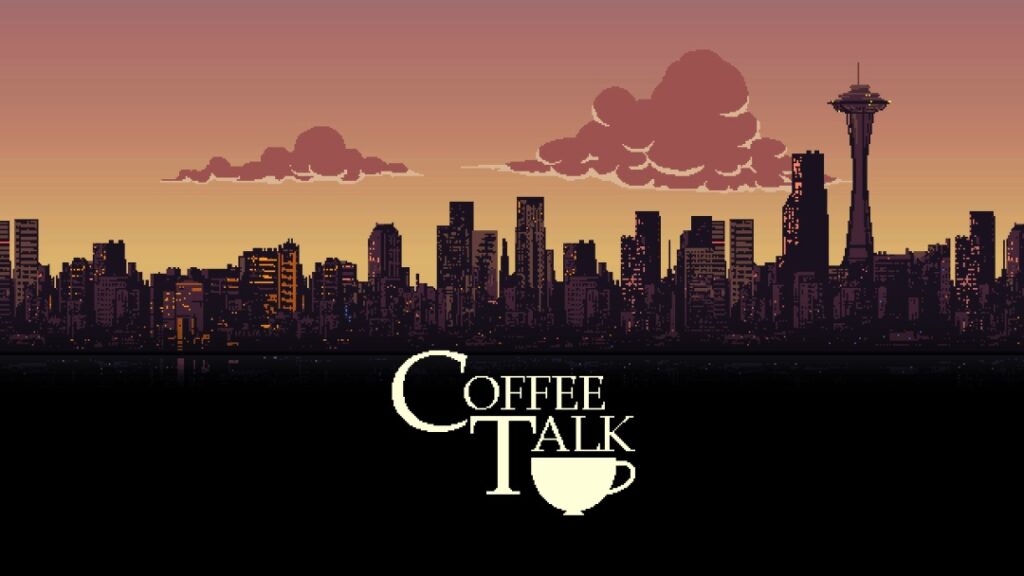
Even before the game’s release, Coffee Talk drew a lot of comparisons to Sukeban’s cult hit, VA-11 Hall-A. Both games are visual novels, with anime-inspired pixel art that involve serving fancy drinks in a fantastical world. Coincidentally, they also both feature cute catgirls among their cast of quirky characters. While I must admit that Coffee Talk stumbles more than a few times in its execution, I still found quite a bit to enjoy in the game’s story, characters, and writing.
Coffee Talk
Developer: Toge Productions
Platforms: Windows PC (Reviewed), Mac, Nintendo Switch, PlayStation 4, Xbox One
Release Date: January 29th, 2020
Players: 1
Price: $12.99
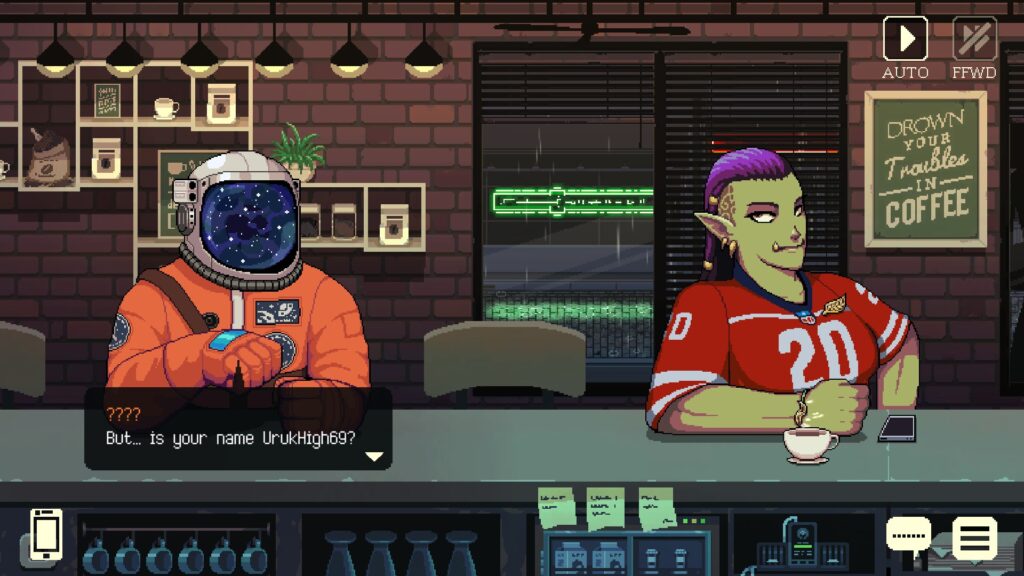
Coffee Talk is set in an alternate version of modern day Seattle. While technology and culture is quite similar to what it is today, humanity lives in relative peace and harmony with a wide range of fantasy races.
Orcs, elves, dwarves, succubi and incubi, merfolk, nekomimis, werewolves, and vampires are all real, and have their own cultures, special needs, preferences, and prejudices.
You play as the faceless barista of a cozy little coffee shop that caters to night owls across the city. The shop is suitably called Coffee Talk, and for many of its regulars, it acts as a comfortable space to make friends and work out their personal issues over a warm cup of their favorite caffeine-infused beverage.
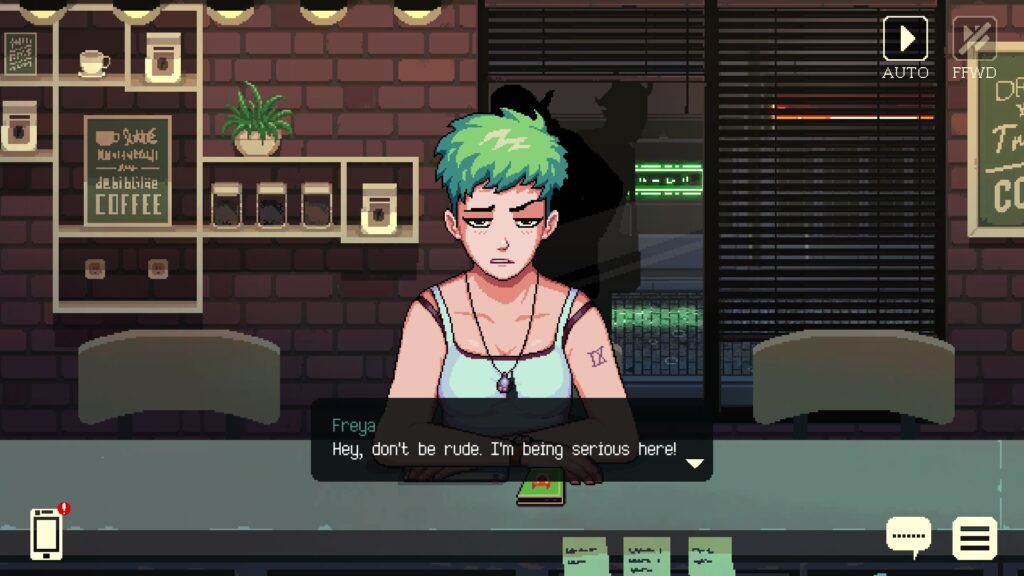
The game’s main story is set over the course of around a month, and focuses mostly on Freyja, a loyal regular that has been a familiar face at Coffee Talk for years.
Bored with her day job at a local newspaper, Freyja wants to finally pursue her dream to become a fiction writer. After some drama one night at the café, she decides to loosely base her first novel on the colorful characters that frequent Coffee Talk.
Just a few of these regulars include a flamboyant vegan vampire supermodel, a popstar idol catgirl with daddy issues, an introverted mermaid looking to break into the game industry, and a socially awkward alien that wants to get laid by some Earthling women.
Everyone at the coffee shop has their own emotional baggage that needs to be sorted out, and as the barista, its your job to help them by serving the right drink at the right time.
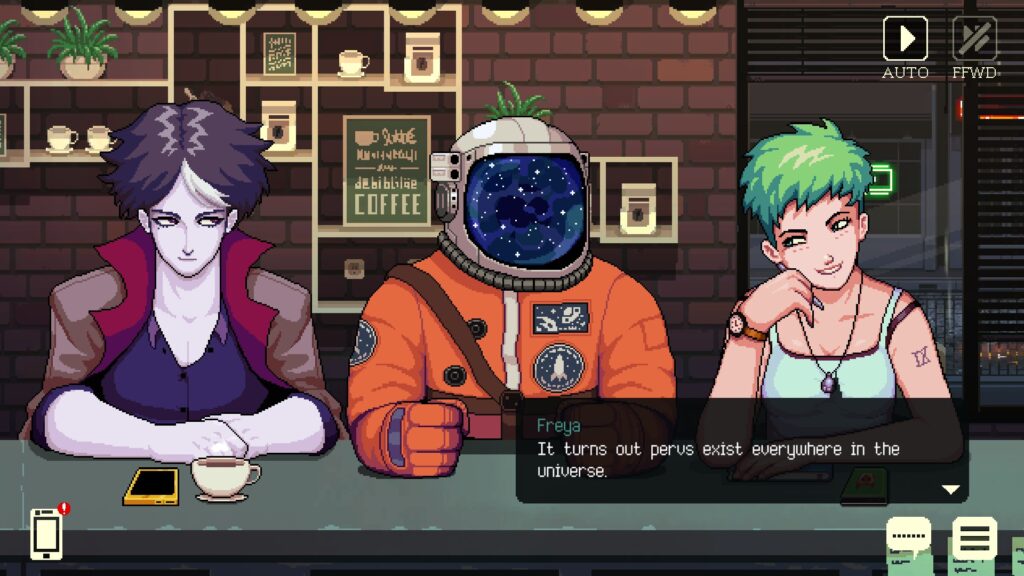
While your character does talk and interact with the others, you don’t have any control over what they actually say. Instead, all of the game’s endings are determined by your ability to serve the perfect drink when a character really needs it.
Despite serving drinks every day, there are only about five really key moments where getting your order right determines how that character’s storyline is resolved. One of these moments even involves giving the character a drink they didn’t order.
The game’s drink mixing system is fairly simplistic, but involves a lot of experimentation. There are several dozen specialty drinks in the game, and when you figure one out, its added to a helpful recipe notepad on your phone.
All drinks are comprised of three core ingredients, and the sequence in which you add them is key. A drink might call for coffee, honey, and cinnamon, but if you don’t place the ingredients in the right order, you’ll mess up the beverage.
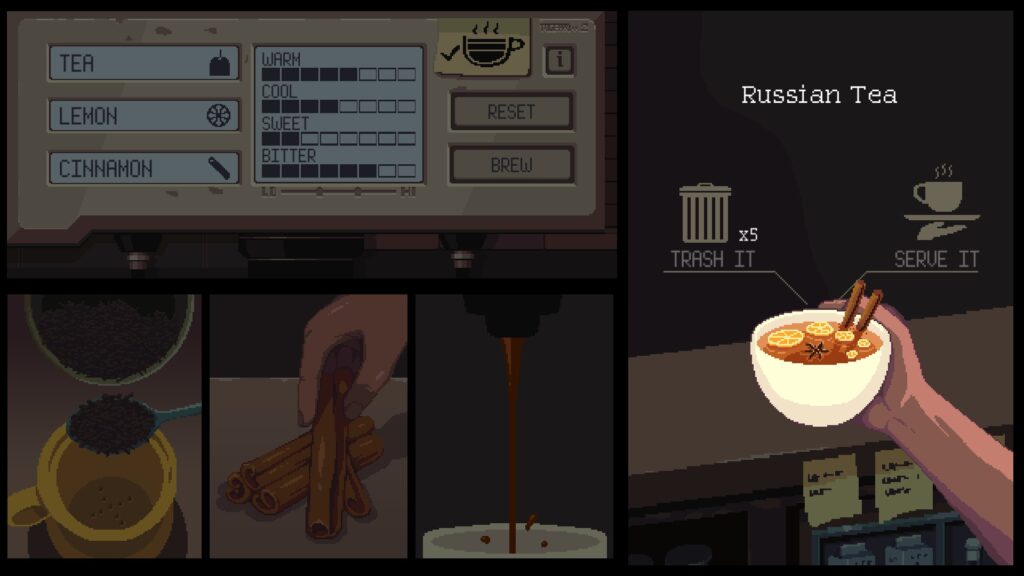
Sometimes the orders can be a bit vague, while other times characters will ask for specific drinks you might not have heard of before.
The developers are Indonesian, so there are a ton of beverages from Southeast Asia that I wasn’t familiar with before playing the game. Luckily, the game is fairly forgiving, and gives you five chances to trash a drink you messed up per day.
Even still, there are a few times where the drink you need to serve is so vague that you may have to resort to a guide. These particular instances are based on the drink’s name and description, so if you haven’t experimented enough and unlocked them yet, you probably won’t get them right your first time through the game.
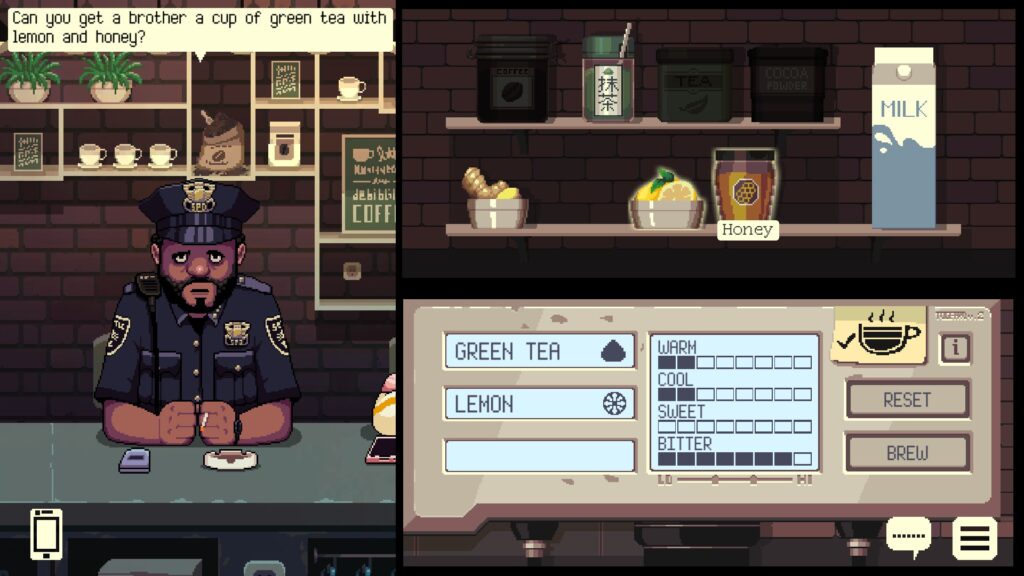
It took me around five hours to complete the game, but there is a decent amount of replayability. As I alluded to earlier, there are several key moments where the story can change. The game also features an endless mode, where players have to correctly serve drinks on a time limit.
This mode actually has a good amount of tension and complexity. Coffee Talk has a large selection of drinks to memorize, and to get those high scores you’ll need to be able to quickly make them without referencing your notepad too much.
This mode is also the only place where about 80% of the game’s drink menu is used, as in the main storyline most characters only have around two specialty drinks they will ever order.
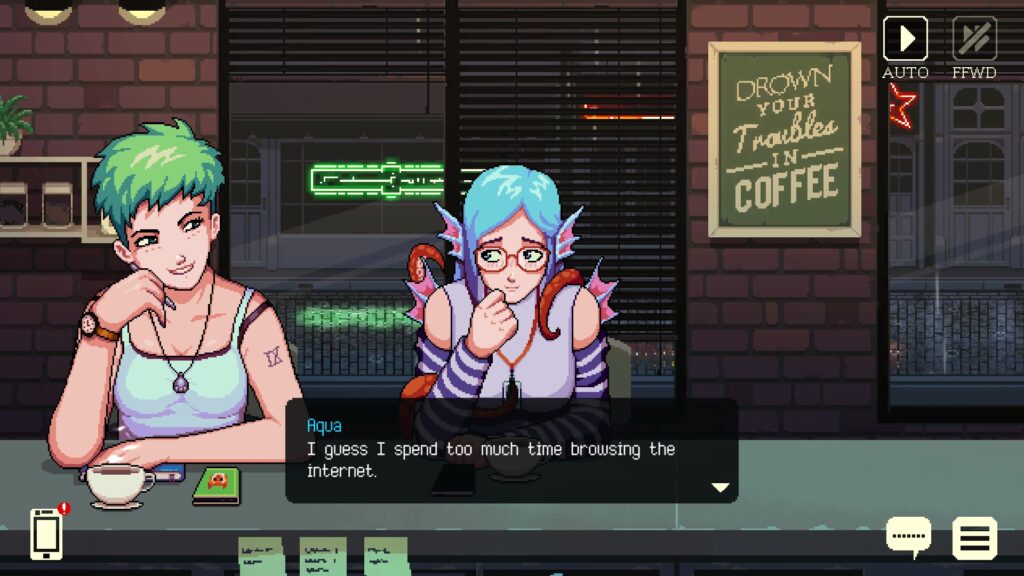
The game’s individual storylines can be a bit cliché and predictable at times, and there are frequent moments of foreshadowing that you would be blind not to pick up on. A good example is the number of times your werewolf friend Gala tells you to make a note of the drink mix that calms him down.
Even with that in mind, I still found the characters and storylines in Coffee Talk to be very enjoyable to read through. There are a lot of different personalities and viewpoints on display among the game’s cast, and I can’t say that I found anyone to be unlikeable or boring.
While the personal storylines are fairly engaging and interesting to follow, one aspect of Coffee Talk that will likely divide gamers is its approach to politics.
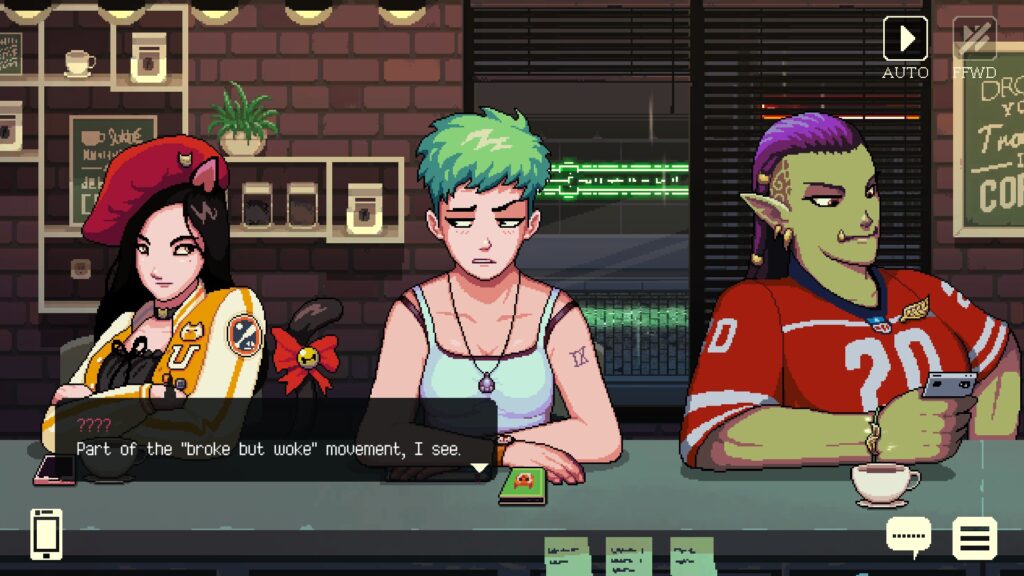
Simply put, I can’t think of the last time I’ve played a game that brought up this many hot button issues. If you can think of a topic that was in the news recently, or gets commonly brought up by blue checkmarks on Twitter, then chances are that Coffee Talk mentions it at least once.
Despite paying lip service to so many topics, Coffee Talk never really digs too deeply into any single one of them. This is where the game will probably divide players the most. People who just want some escapism will likely groan at these references.
Meanwhile, those who actually do want games to address lots of political issues will probably be mad at the way Coffee Talk handles these topics. I doubt anyone will be satisfied either way.
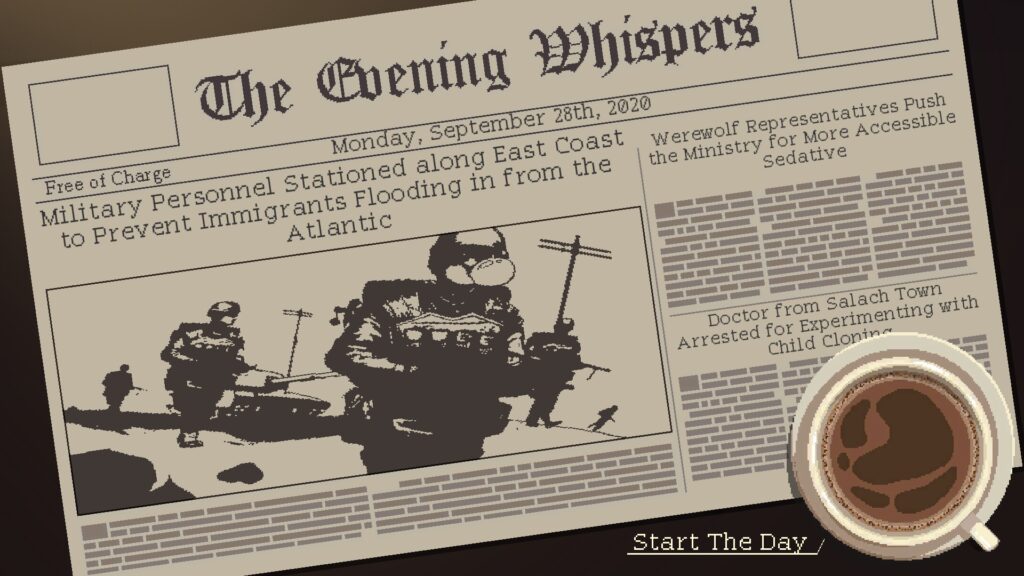
Coffee Talk‘s approach to addressing these modern issues often comes off as feeling forced and out of place. For a game that features werewolves, catgirls, elves, and demons walking openly among society, it just feels so mundane and boring to have the characters so frequently bring up real world social and political issues.
That isn’t to say that the game doesn’t feature some interesting worldbuilding related to fantasy races in a modern setting, however.
For example, Gala’s discussions often center around werewolves being desperate for doctors and scientists to develop a safe and effective medication to suppress their rage during full moons.
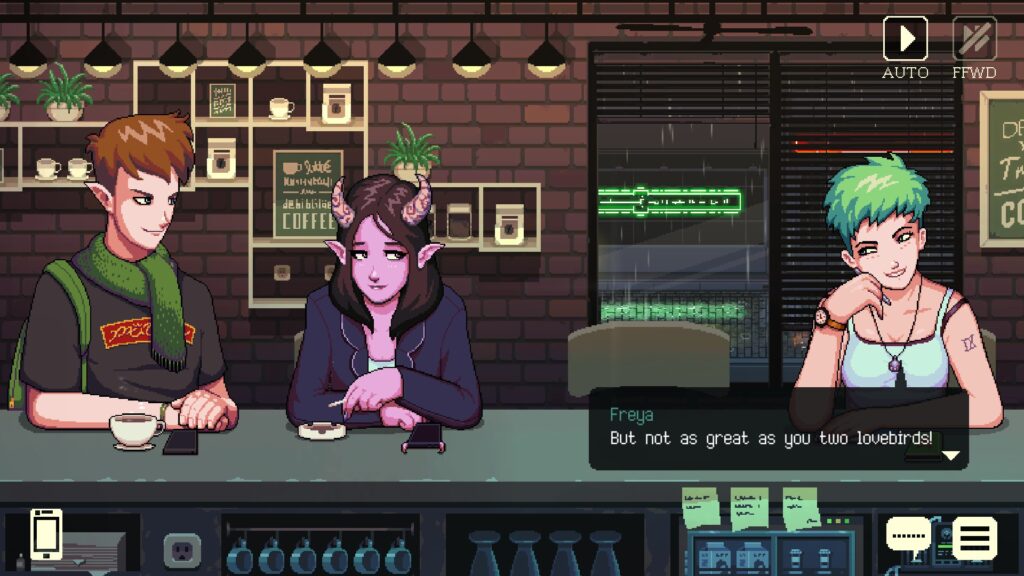
Meanwhile, Baileys’ and Lua’s storyline is about their parents disapproving of a relationship between an elf and a succubus. While the storyline touches on many traditional interracial couples troupes, a big part of it is that Baileys’ will lose his immortality if his family disowns him.
I also have to give the game praise for its comfy presentation. The game’s pixel art and UI are clean and visually appealing, and do an admirable job mimicking the aesthetic of old Japanese adventure games.
The character models feature a small amount of animation that change to reinforce their mood and the direction of a conversation, and you can see the silhouettes of various people walk past the coffee shop’s front window down the rainy streets of Seattle.
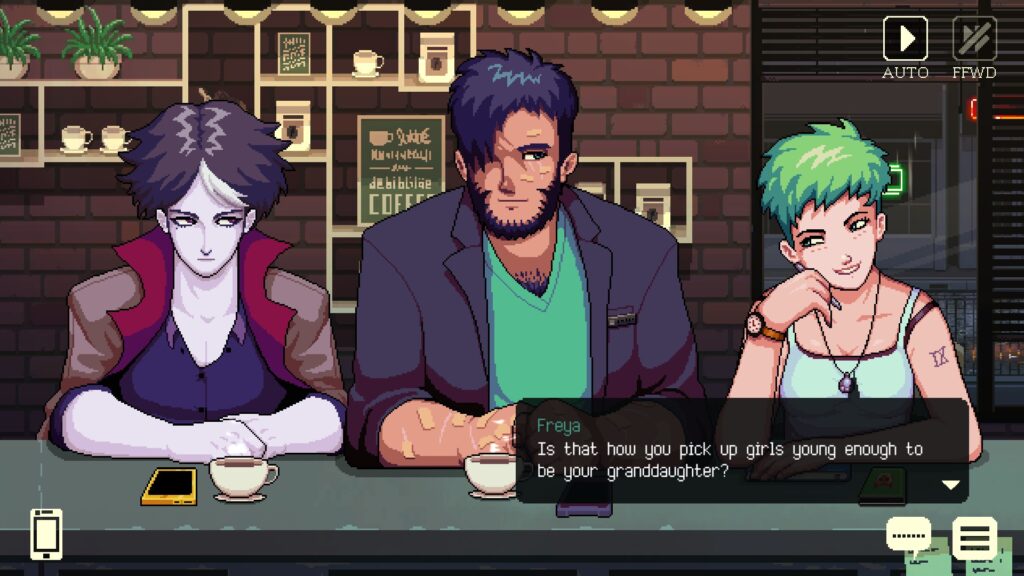
The soundtrack is also nice, and consists of a variety of calm, soothing tunes that help reinforce the game’s small café atmosphere. Another neat touch is that you can switch tracks at will by pulling up a smart phone interface menu in the corner of the screen.
This same interface also contains the recipe notepad, a Facebook knockoff where you can read more about the characters, and a collection of Freyja’s previous short stories.
It might not be for everyone, but I ended up enjoying my time with Coffee Talk. While I personally liked the writing, characters, and atmosphere, I must admit that the game doesn’t really present anything that you haven’t probably already seen before elsewhere.
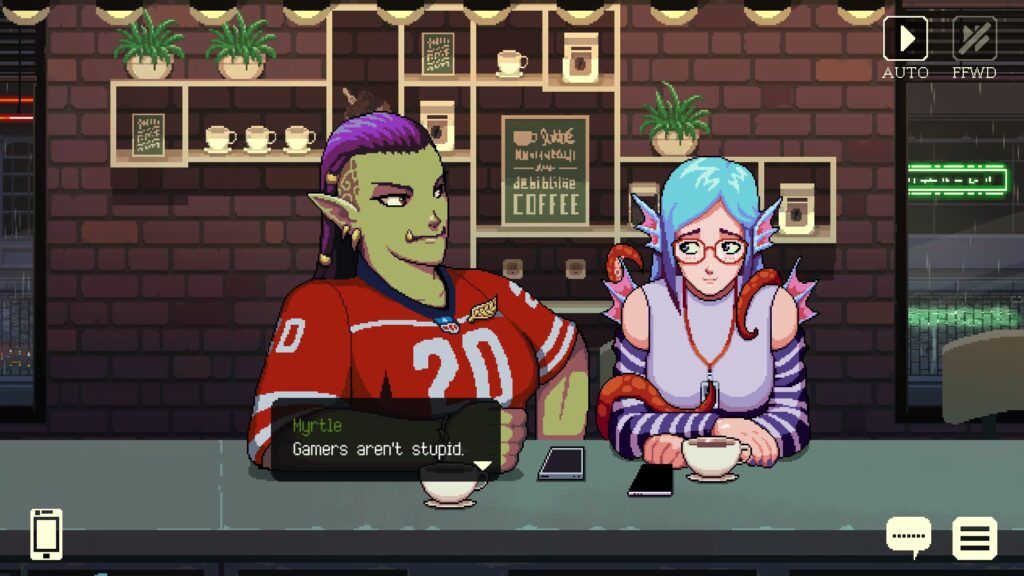
The biggest turn off for many will likely be the sheer number of references to modern politics. While the game never gets too preachy, the fact that these references are there at all will probably alienate more than a few gamers from all ranges of the political spectrum.
If you can get past that however, you’ll find a fairly chill and relaxing visual novel that has some decent worldbuilding and a likeable cast of characters.
Coffee Talk was reviewed on Windows PC using a review copy provided by Toge Productions. You can find additional information about Niche Gamer’s review/ethics policy here.